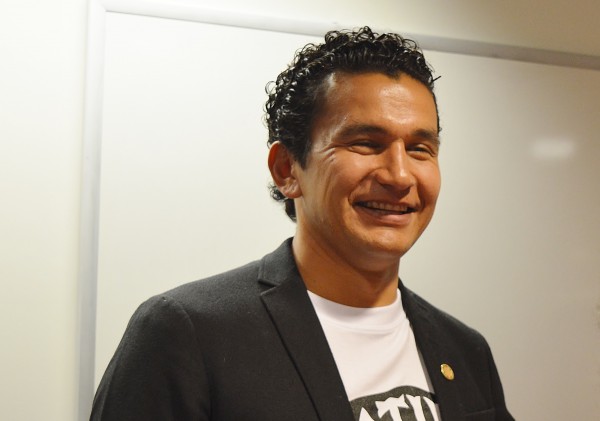Journalist speaks to students about residential schooling, his new book and politics
Named by Postmedia News as one of “Nine Aboriginal Movers and shakers You Should Know” and as “The Accidental Journalist” by the Globe and Mail, Wab Kinew is a profound name in the broadcasting and journalism industry.
Kinew, who is also associate vice-president for indigenous relations at the University of Winnipeg, came to George Brown College on Sept. 23 as part of the diversity, equity and human rights services speaker series.
He took everyone by surprise when he began introducing himself in his native language of Ojibwe before translating it into English for the audience.
Kinew is an advocate for indigenous people in the country and during the session, he stressed the impact that residential schooling had on his family as well as his own life. He shared with the audience the atrocities that his ancestors went through in their life when at residential schools, sharing the experience of his father who attended a residential school.
After his father’s death, Kinew learned that his father had been part of a series of nutritional experiments that were conducted on residential school children in the 1940s and 1950s.
“I would ask that you consider what you could do to offset some of the contemporary realities which are a legacy of that history of these lands,” he asked the audience, explaining that abuse and alcoholism within families are ways in which the effects of residential schools carry on today.
Kinew’s forthcoming book The Reason You Walk is based on Kinew and his father’s relationship and how his father was impacted by residential school and the segregation of indigenous people.
“I realized how he was made to feel by the priests and nuns of residential school as a result of discipline and anger with the way they raised him and how he raised me in a very similar way with the harsh discipline and anger. And then, as I was writing this book, I reflected upon how I am raising my son,” said Kinew. The book delves into healing and finding forgiveness.
“Even for a family such as ours, where we managed to be successful, where we managed to participate in mainstream society while still holding on to our indigenous identities, residential school experience still has meaning,” he added.
Kinew also threw light on several important issues like discrimination towards indigenous nations and insufficient availability of clean drinking water. He noted that this is a crucial time for Canadians to ask election candidates about such topics.
With respect to Prime Minister Stephen Harper’s statement referring to “old-stock Canadians”, Kinew noted that he thought the explanation Harper gave of the phrase was most illustrative and insightful. Harper said that “old-stock Canadians” referred to the descendants of immigrants.
“In his vision of what Canada is, he has no place for my people. Because he would have said otherwise immigrants and indigenous people and their descendants,” said Kinew. “When I heard that line ‘old-stock Canadians’ and its clarification I thought to myself that we must be then extra old stock.”


